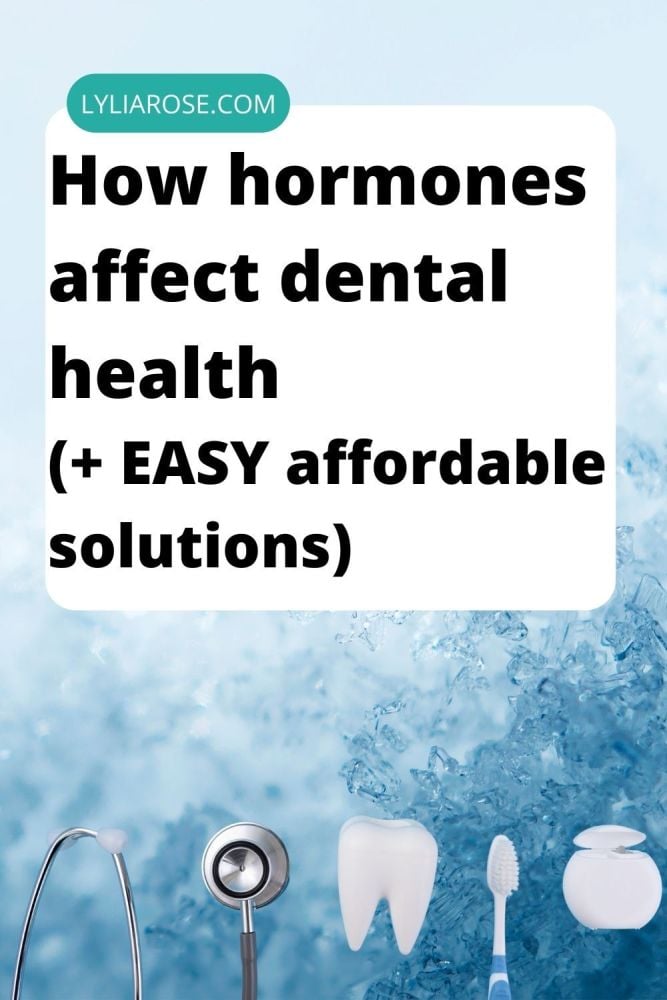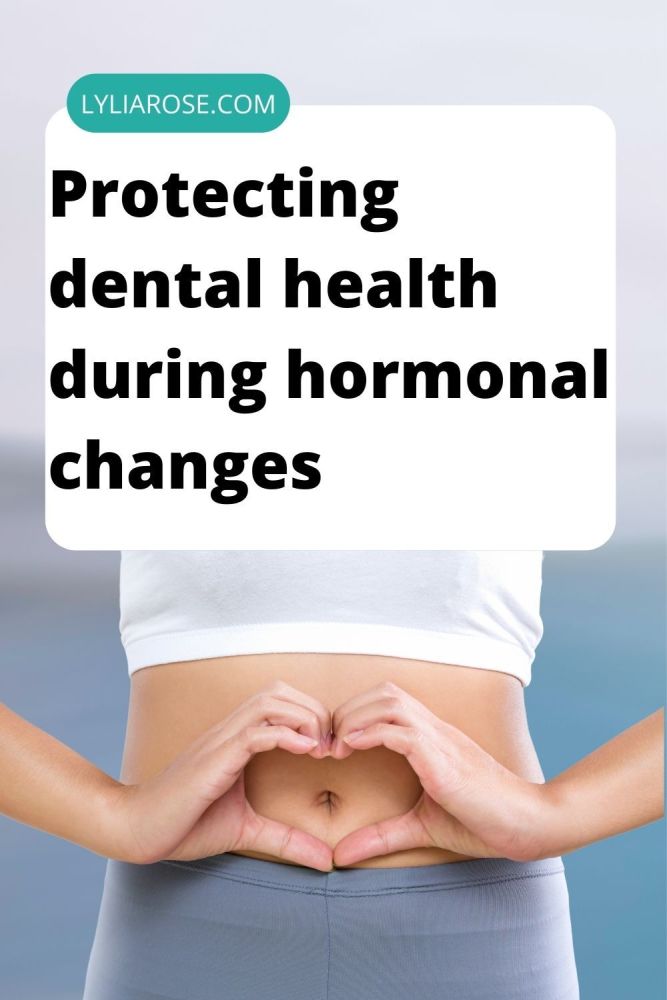How hormones affect dental health (and what to do)
Posted on
Did you know female hormones can have a direct impact on oral health? In this article we reveal how hormones affect dental health and find some easy, affordable solutions to keep your smile healthy.

How hormones affect oral health
When you think of dental health, you probably think of brushing your teeth and making sure to floss. But did you know that hormones can also affect your oral health?
In recent years, there has been growing research into the importance of oral health for women, particularly at certain stages in their life. Hormonal fluctuations in women during puberty, menstruation, pregnancy and meonpause can cause significant changes in the mouth and gums.
These changes can lead to health concerns in the rest of the body if not prevented or addressed. The mouth is often the first place where harmful infection, disease and illness from external sources can enter, so it’s vital to maintain good oral hygiene; as Julia Lange Kessler points out: “the mouth is the gateway to the body”.
Let’s explore how hormonal changes affect the dental health of females and what we can do to minimise the risk.
How puberty affects oral health
There have been investigations to confirm whether oral health changes during puberty. Several studies have discovered a change and increase in microbial growth within the mouth during the onset of puberty; the change in hormones during this time can cause more bacteria to form over the teeth. This may explain the prevalence of gingivitus, a type of gum disease that can cause gum inflammation, bleeding gums, receding gums and bad breath, in adolesences.
“The changes observed in the subgingival microbiota during puberty may be related to the development of gingivitis, which was demonstrated by a higher tendency for gingival bleeding during the course of the pubertal maturation process.” - Changes in subgingival microbiota during puberty. A 4-year longitudinal study
How menstruation affects oral health
Unfortunately, for women, they maybe more prone to oral health problems due to regular fluctuations throughout their life, most notably on a monthly basis due to the menstrual cycle.
A 2018 study discovered that the monthly fluctuation of hormones due to the menstrual cycle can cause significant oral changes, including bright red hypertrophic gingiva (overgrown gums) and salivary glands, development of canker sores (ulcers), or bleeding gums.
The condition is called menstruation gingivitus and usually occurs a for a day or two before menstruation begins. It resolves itself, usually, disappearing once the period starts or at the end.
How pregnancy affects oral health
Pregnancy can also affect the teeth and gums; a sign of early pregnancy can be bleeding gums!
Hormones in pregnancy can cause more bloodflow to the gums, resulting in bleeding gums. As with most pregnancy symptoms, bleeding gums should come to an end once baby arrives.
However, it’s advisable for pregnant women to have regular checkups with dentists during pregnancy to ensure it’s not gum disease or an infection.
Chronic periodontal infections may cause premature birth, preeclampsia, low birth weight and more pregnancy complications.
A 2021 study found that hormonal changes involved with pregnancy can increase chances of oral infections and adverse pregnancy outcomes:
-
Pregnancy accompanies a series of changes that increase the susceptibility of the woman to various infections including periodontal disease.
-
Chronic periodontal infections can cause local and systemic inflammatory response.
-
Chronic periodontal infections are associated with adverse pregnancy outcomes.
-
A bidirectional relationship is proposed between the oral microbiota and pregnancy.
How the menopause affects oral health
The hormonal changes that happen right before menopause can affect the balance of good and bacteria in the mouth. In turn, this decreases the body’s ability to fight off some infections makng a woman more susceptible to illness during the perimenopause.
A comprehensive review of the data available found that the following oral health issues were most prevelant during menopause:
|
Periodontol disease |
60% |
|
Dry mouth |
25% |
|
Burning mouth |
15% |
They state these issues can cause further oral health complaints such as “the occurrence of oral mucosal and dental diseases, such as candidiasis”. Candidasis in the mouth is more commonly known as oral thrush, a yeast infection which can cause pain inside the mouth.
Hormonal changes during menopause make the gums more susceptible to plaque leading to an increased risk of gingivtius. The hormones can even reduce bone density and combined with other oral issues, can cause tooth loss in some instances.
“After menopause, women become more susceptible to periodontal disease. We believe the problem is due in large part to estrogen deficiency with resulting bone loss and inflammatory processes. Osteoporosis and periodontal disease are best diagnosed early so that treatment can be started sooner and fractures and tooth loss can be prevented.” - How menopause affects oral health, and what we can do about it - PubMed (nih.gov)
How to protect dental health during hormonal changes
The good news is that there are some easy solutions to help combat this problem!
Hormonal fluctuations may be part of nature and being female, but there are some simple and cost-effective methods that can improve oral health for women and aim to prevent dental issues.
Let’s take a look.
Make small changes when pregnant
Pregnancy gingivitus is a common complaint caused by pregnancy hormones, which can’t be helped, but there are some other causes which can be managed including:
-
Dietary changes: Pregnancy can cause a craving for unhealthier foods which can create a buildup of plaque and increase the likelihood of dental complaints. Following a healthy diet with plenty of fresh fruits and vegetables, whole grains, water and healthy proteins and minimizing refined carbohydrates, salty, and sugary junk foods is best.
-
Toothpaste aversion: Changes in taste and smell can cause a pregnant woman to feel nauseous at the strong smell of minty toothpaste. Switch to a milder toothpaste while pregnant and continue to brush at least twice per day.
-
Morning sickness: Sickness such as morning sickness or hyperemesis gravidarum can cause damage to teeth from acid. Always rinse the mouth and teeth with water after sickness.
Attend a free dental checkup when pregnant
It can sometimes be difficult to afford dental treatments but during pregnancy, and for the first 12 months after the baby is born, UK women are entitled to free NHS dental treatment and checkups.
This applies to any treatment started during this period only and not treatment already in progress.
A midwife or issue will be able to issue a maternity exemption certificate.
Chew sugar-free gum
Chewing sugar-free gum in between meals can boost oral health by stimulating saliva production, cleansing the teeth of food particles which prevents the buildup of harmful plaque-causing bacteria.
A 2020 literature review called A Systematic Review and Meta-Analysis of the Role of Sugar-Free Chewing Gum in Dental Caries found that chewing sugar-free gum alongside regular brushing can reduce the risk of cavities.
A 2011 study found sugar-free gum can promote boost the immune system, support a healthy microbiome, and even prevent respiratory infections
However, it’s important to note that not all sugar-free gum is created equal and some contain questionable ingredients such as artificial sweeteners which should be avoided.
Sugar-free gum sweetened with xylitol, and not artificial sweeteners, is best for overall and dental health. Xylitol is a low-calorie natural sweetener which can help prevent tooth decay by reducing the amount of plaque causing bacteria.
Chewing gum sweetened with xylitol after meals is a cheap and effective way to help prevent tooth decay. Xylitol is non-fermentable, so the bacteria in the mouth can’t convert it into a harmful acid.
As well as inhibiting the growth of bacteria, there are studies showing xylitol can boost the immune system, so the benefits are plenty.
Eat foods that promote oral health
Making better decisions when it comes to dietary habits can improve oral hygiene. There are lots of foods that are good for teeth including:
-
Leafy greens
-
Apples
-
Carrots
-
Green tea
-
Onions
-
Celery
-
Almonds
-
Strawberries
Fibre rich fruits and vegetables are best for keeping teeth and gums clean. Crunchy vegetables that contain lots of water help to produce more saliva which cleanses the teeth.
Leafy greens such as kale and spinach are high in calcium which can help to build tooth enamel.
Strawberries contain xylitol which can prevent cavities (they also contain malic acid which can whiten teeth).
Drink water for better oral health
Dehydration can cause dry mouth and prevents the teeth, gums and tongue from being cleansed by saliva. Less saliva also equals more bad bacteria in the mouth causing periodontal disease.
Water is the best drink to stay hydrated. Water also helps to clean the teeth of food after eating.
For the purest water, check our megahome water distiller review.
Stop bad habits
It goes without saying that some bad habits are terrible for oral health and will only exacerbate any conditons caused by hormonal changes.
For starters, quit smoking for good, don’t chew tobacco, stop drinking alcohol, avoid toffee or sticky hard candies, eat less inflammatory foods, skip the fizzy pop and reduce refined sugar intake.
Final word on how hormones affect oral health and what to do
Hormone fluctuations throughout a woman’s life can affect oral health and increase the risk of gum disease and other health conditions.
There are ways to minimize the risk and promote good dental health such as maintaining oral hygiene when pregnant, attending dental checkups, eating foods that are good for teeth, drinking water and quitting habits that are detrimental to health and teeth.
And, it goes without saying, don’t aggressively brush your teeth, make sure you go to your dentist appointments and don’t forget to floss daily and brush your teeth twice per day!

